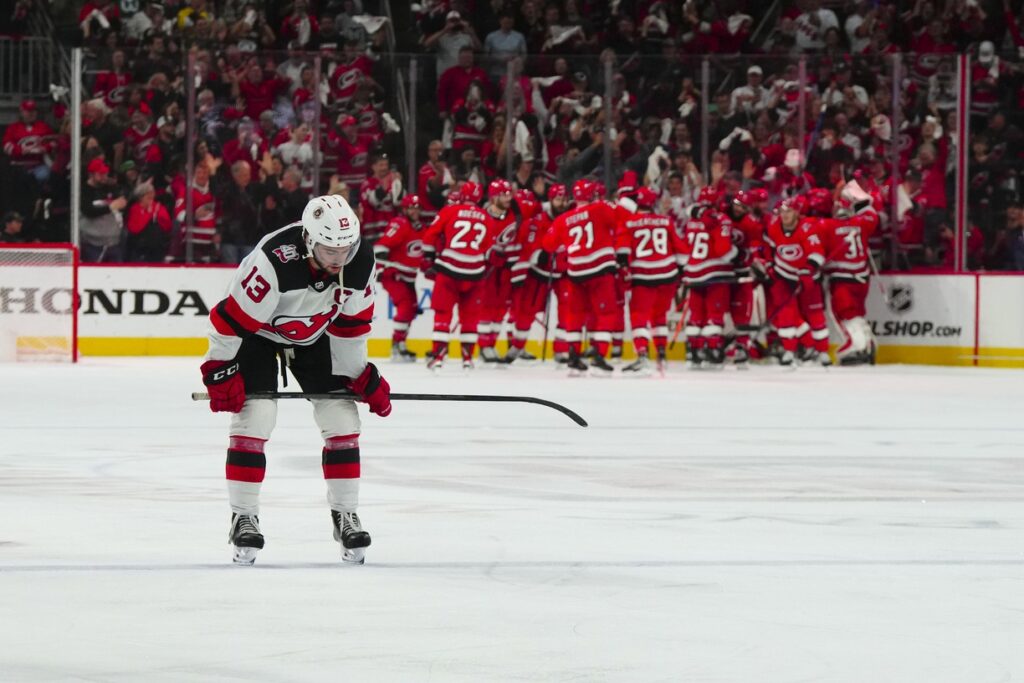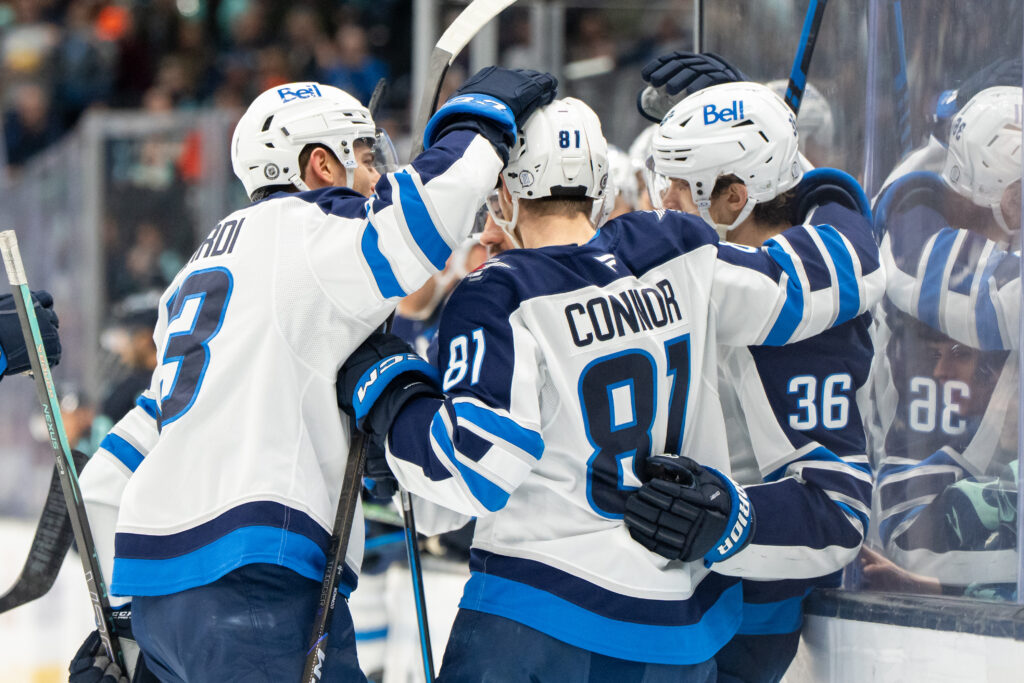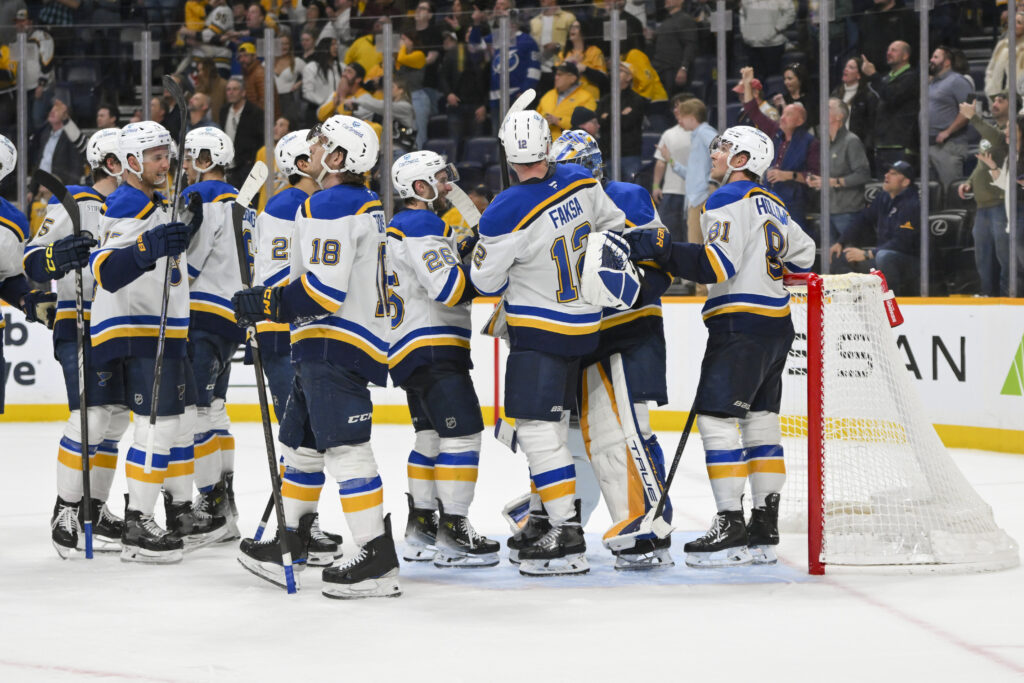Before we get into the negatives that cost the New Jersey Devils their hopes of keeping their Stanley Cup run alive, it’s important we understand how successful of a season this was for the team.
Everyone knew their production would increase from the 27-46-9 record in 2021-2022, but I don’t think even Devils fans imagined the team would turn around and make the largest point improvement in NHL history. It was a year of breaking records. The Devils 52 regular season wins are now the most in franchise history and Jack Hughes is now the leading point scorer in franchise history surpassing Patrik Elias.
The Devils also broke their franchise record for most points in a single season with 112. The goal in the offseason was to become contenders for the playoffs. Instead, the Devils not only made the playoffs but won a grueling round against their rival New York Rangers. So, what went wrong to end such a magical season? We will dive into that next with four takeaways from the first two rounds.
What Went Wrong for the Devils
Goaltending
In the regular season, Vitek Vanecek was a workhorse for the Devils. His role immensely increased from his 2021-2022 season with the Washington Capitals. He started 10 more games this season than his previous one, making him THE go-to guy in New Jersey when Mackenzie Blackwood went down with an injury at the beginning of the year.
He started in 52 games as the Devils’ 1A goaltender and outperformed expectations. Vanecek finished strong with a 33-11-4 record. More importantly, he finished with a 2.45 GAA (Goals-Against Average) and a .911 SV% (Save Percentage). That’s a huge increase in production than what the Devils have had in previous years.
When the Devils signed the Czechia native to a three-year, $3.4 million contract, they were looking for competent goaltending and Vanecek gave them much more than that. However, towards the end of the season, you could see his numbers were beginning to slip and he was having trouble corralling rebounds.
Unfortunately for Vanecek, he brought that same performance into the playoffs. Though the Devils certainly didn’t help, Vanecek and his team were blown out and embarrassed in their first two games against their bitter rivals with a score of 5-1.
In game one, Vanecek finished with a .818 SV% giving up four goals on 22 shots. In game two, Vitek finished with a .833 SV% giving up five goals on 30 shots. Though Vanecek did not get much help in front of him from his fellow teammates who gave up breakaway after breakaway, his numbers were still unacceptable.
Lindy Ruff knew those numbers weren’t sustainable over a seven-game series, but he had no time to waste, so he turned to rookie goaltender Akira Schmid. Obviously, we all know what Schmid did next and we probably won’t ever forget it. After the miraculous comeback Schmid and the Devils made in their seven-game series against the New York Rangers, it was on to Carolina.
With no time to rest, Ruff went back to Schmid for round two and he was not the same. He looked shaky, getting blown out and pulled in the first two games of the series. Ruff then went back to Vanecek to start game three and, though the Devils won that game because they scored eight goals, Vanecek still gave up four in the process and did not look good by any means. Another blowout in game five and a hard-fought battle in game six brought the Devils season to an end.
The Devils finished their playoffs with Vanecek finishing dead last in playoff goaltender ranking with a –7.6 GSAE (Goals Saved Above Expected).
Discipline
Many teams were complaining about the penalties called in the playoffs this year, so I don’t want to harp on this too much. However, the Devils simply took way too many penalties.
When matching up against the New York Rangers in game one, the game plan was to stay disciplined considering the New York Rangers’ lethal powerplay. In games one and two, the Devils allowed four power-play goals. That’s a recipe for disaster against a team like the Rangers who are incredible on the cycle. In game two alone, the Devils took 14 penalties!
After the seven-game series concluded, the teams finished about even on total penalties with the Rangers besting the Devils 39-38. Even though the two teams ended evenly, I can promise you that was not the game plan considering Ruff knew the Devils would have to stay out of the box to keep the Rangers power play aces off the ice. Especially with how absolutely dreadful the Devils were on their own power play.
Now in the second series against Carolina, the Devils were much more disciplined. They held themselves to under five penalties in every game, which was a much better recipe for victory. The most frustrating part, though, was the way they took their penalties.
The two that stuck out the most to me were when Tomas Tatar took a late cross-check from Sebastian Aho after the play and Tatar reacted with a slash. Aho was a pest in the series, and he had been trying to get under many players’ skin. Well, Tatar got frustrated and gave Aho exactly what he was looking for.
The second penalty that really bothered me was, of course, the final penalty to end the season. Game six was a tight defensive battle. You could tell from the beginning there wasn’t much ice to work with and the goalies were swallowing their rebounds. We ended up getting to see some extra hockey, but it didn’t last long considering Jonas Siegenthaler was looking to clear a puck and sent it over the wall. Go figure, the Devils end their season on a stupid mistake that results in a power-play goal for the Carolina Hurricanes.
“Compete”
The one word Ruff harped on all season: compete.
If you followed along for most of the games, you’d realize that after a handful of losses, Ruff would address the media by saying he didn’t like the Devils compete level tonight. With the system Ruff has the speedy Devils playing, their competitive level must always be high, or it simply will not end well.
The Devils generate their goals off five-on-five play due to their speed and the way they can stretch the ice. So, what happens when the Devils don’t bring their A-game? Well, it normally doesn’t end well and that’s exactly what we saw in a handful of playoff games.
A perfect example was the first two games against the Rangers. The Devils were blown out of their own barn, 5-1. Did those performances stem from jitters? Sure, I bet some of it did, but they looked completely out of sync from the second the puck dropped. The defense looked confused, they weren’t getting pucks deep enough out of their zone, careless penalties, turnovers, bobbling pucks, you name it. Eventually, the Devils got it together and turned the series around once Schmid came in.
Against Carolina, the same thing happened to start the series. They were blown out, 5-1 and 6-1. Maybe some of this was a result of having little-to-no time to rest whereas the Canes had four days off, but this is the playoffs…nothing is going to come easy. New Jersey then followed that up with another game-four whooping of 6-1. That’s three games in the series where New Jersey simply just threw their opportunities in the dumpster. There were plenty of reasons why the Carolina Hurricanes were so dominant but no doubt, one of them was because of New Jersey’s complete level.
Experience
Believe me, the last thing I want to discuss, considering I’m a Devils fan, is lack of experience. I’m going to make my final takeaway short because I’m sure we’ve all heard it enough from Mark Messier considering it’s all he would ever say when belittling the Devils on camera. Unfortunately, he’s right to an extent.
I don’t agree with how important experience is in the playoffs, but it certainly is a factor. The Devils had a few guys in their locker room with some experience but not too much. For the most part, this team consists of a bunch of kids who are getting their first lick of playoff action. It’s their first time playing in a game of seven series and having to erase their memories of the previous game and move on almost immediately.
Now, with at least some playoff experience, this team has an idea of what putting it all on the line to advance is all about. Luckily for the New Jersey Devils, they can take this series as a lesson learned and should have plenty of opportunities in the future. Their Stanley Cup window is just beginning to open and it’s going to be one heck of a ride for the next 10 or so years.
Main Image: James Guillory-USA TODAY Sports



